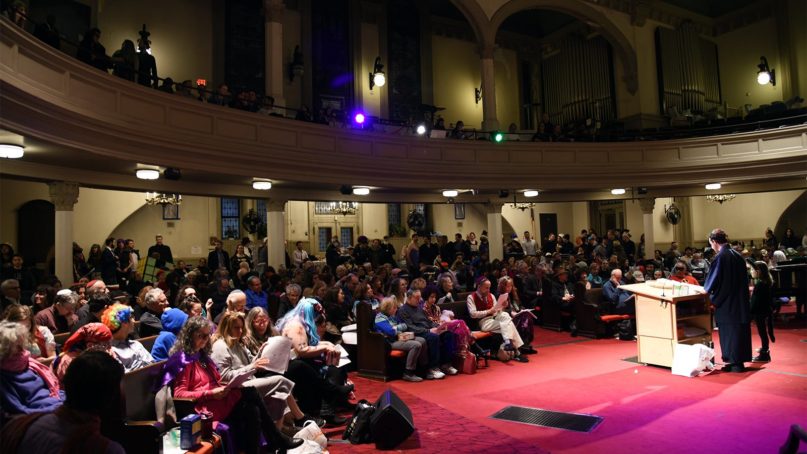NEW YORK (RNS) — A Presbyterian who unknowingly wandered into West End Presbyterian Church on Manhattan’s Upper West Side last week on the eve of the Jewish High Holidays might have been stunned to find the nearly 1,000 members of the Romemu congregation inhabiting the red-carpeted Romanesque-revival space, combining the traditional Rosh Hashana liturgy with ecstatic chants, moments of silent meditation and uninhibited dancing.
Then again, so might many Jews who are unfamiliar with Romemu’s unorthodox spectacle.
Romemu’s energy, its interfaith influences and egalitarian worship — not to mention its sheer size — have made it a phenomenon in a city that has no lack of standout synagogues. It draws Jews of all ages, races and denominations, former Orthodox Jews to spiritual seekers, Wall Streeters to queer kids. Women don colorful prayer shawls and children run rampant in the aisles.
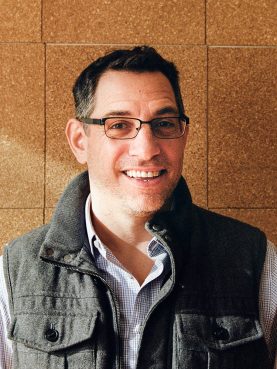
Rabbi David Ingber founded Romemu in 2008. Photo by Luis Burgos
Founded in 2008 as an outpost of the Jewish Renewal movement, Romemu has since grown from a handful of members using a borrowed Torah to a thriving congregation with 600 families and more than a dozen full-time staffers. At the Jewish holidays in recent years, the crowd has overflowed shared space at West End Presbyterian, causing Romemu to meet at the more commodious Redeemer Presbyterian Church 20 blocks south.
Some of Romemu’s success is no doubt due to the show at the center of its worship. At West End Presbyterian on erev Rosh Hashana, a nine-person band — singers, a guitarist, pianist, flutist, double bassist and violinist — took center stage in front of the church’s temporarily obscured altar to lead the evening’s festivities and prayers. In the middle, pounding on the drums, was Romemu’s founder and senior rabbi, David Ingber.
But Romemu’s popularity goes beyond its presentation. “We’re working on becoming a real alternative to what many consider to be a Judaism where spirituality is not sufficiently addressed,” Ingber, 50, told Religion News Service.
“I get a lot of spiritual engagement from Romemu that I wouldn’t usually get,” said Gavi Strauss, a recent graduate of a joint program of Columbia University and Jewish Theological Seminary who doesn’t identify with any mainstream denomination of Judaism but considers himself religious.
While Strauss appreciates that Romemu departs from many Jewish norms — including “people looking into a siddur (prayer book) and mumbling to themselves,” he said — he also likes the balance Romemu finds between tradition and nonconformism.
“There are few places around that are as informed by traditional, establishment Judaism, but at the same time not tied to or bound by it,” he said.
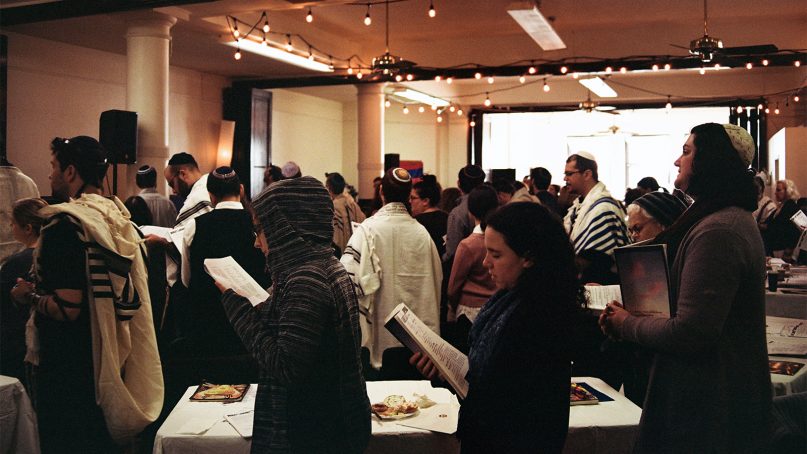
People participate in the Romemu Yeshiva in New York. Photo by Luis Burgos
“Romemu teaches us that you can’t get all of your spiritual vitamins from one single tradition,” said the Rev. Eleanor Harrison Bregman, a United Church of Christ minister who serves as the synagogue’s director of multifaith initiatives. “It is possible to hold a certain amount of paradox and complexity between being a community that is deeply rooted in Judaism while being accessible and open enough for anyone that walks through its doors.”
Harrison Bregman’s job is to create a safe space for interfaith families and couples who want to connect with Romemu without feeling like outsiders.
A monthly discussion series, Strangers No More, Harrison Bregman said, is aimed at ensuring that nobody at Romemu feels as she and her husband, Peter, did when, before they moved to New York, they applied to become members of a Conservative synagogue. The synagogue sent back a single-parent family membership packet, Peter said, because his wife wasn’t Jewish.
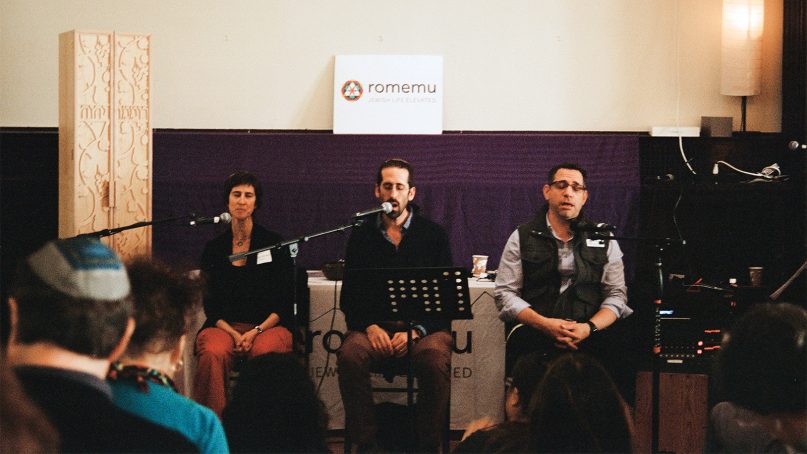
Rabbi David Ingber, right, during a Romemu service. Photo by Luis Burgos
Romemu’s strong interfaith orientation is rooted in Ingber’s own story, including a time when he had strayed from Judaism after growing up Orthodox on Long Island, N.Y., and spent time in India.
But more significantly, it grows out of the history of the Jewish Renewal movement itself. His mentor, Rabbi Zalman Schachter-Shalomi, who founded the movement in the 1970s, taught him to combine ancient Jewish teachings of mysticism with Buddhist meditation techniques and other Eastern spiritual practices, in part as a way to capture a modern American, liberal audience.
“Too many shuls and churches have become mere life cycle celebration places for bar mitzvahs and weddings,” Schachter-Shalomi said at a packed forum at Romemu in 2011. He was intent on infusing Jewish prayer and services with more joy, music and dance, an approach one of his former students described as davvenology.
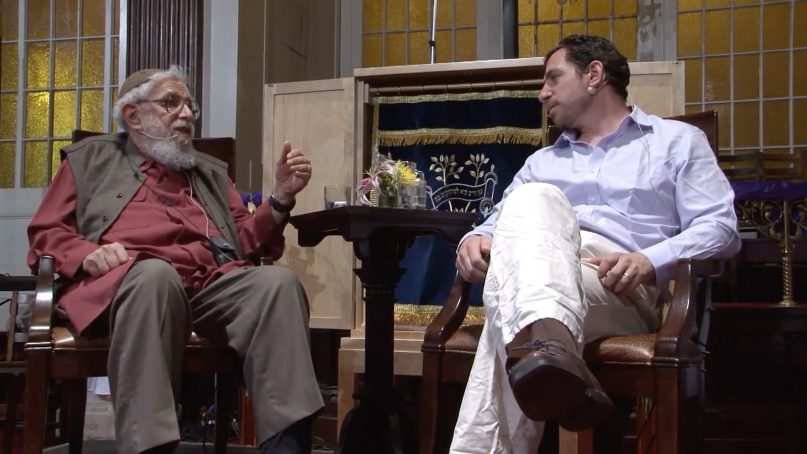
Rabbi Zalman Schachter-Shalomi, left, and Rabbi David Ingber in 2011. Video screengrab
An exile from Nazi-occupied Austria, Schachter-Shalomi immigrated to the United States and eventually studied under the sixth Lubavitcher rebbe, Yosef Yitzchak Schneersohn, and received smicha, rabbinical ordination, under the Chabad-Lubavitch movement, a spiritual branch of Hasidism with roots in 18th-century Russia.
Schneersohn dispatched Schachter-Shalomi to American college campuses to meet secular, assimilated or unaffiliated students in the early 1960s, where he met mystics from other faiths and began laying the groundwork for the Renewal movement. Eventually, after Schachter-Shalomi began experimenting with psychedelic drugs, meeting with the Dalai Lama and speaking on topics such as “Kabbalah and LSD,” the Chabad movement distanced itself from him.
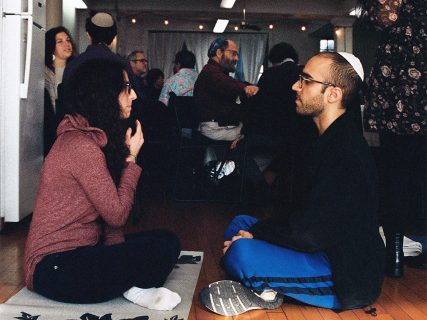
People participate in the Romemu Yeshiva in New York. Photo by Luis Burgos
While some have questioned whether the Renewal movement can survive without Schachter-Shalomi, who died in 2014, Romemu and the approximately 45 other Renewal communities worldwide show no signs of the movement slowing down.
Ingber is making sure that it deepens as it grows. This past June, Romemu launched a six-week adult learning program called Romemu Yeshiva for 22 fellows from across the globe. Instead of rote learning, the course of study includes, Ingber said, “meditation, mindfulness and contemporary Jewish practice.”
This blend of spiritual curiosity about Eastern religions and Judaism is nothing new, though in the past it has been restricted to certain Jewish intellectual circles. The surprise of Romemu is that this formula — what Ingber calls “the neo-kabalistic and neo-Hasidic vein that is open to all” — has exhibited its appeal to an ever widening audience.
(This story has been corrected. An earlier version failed to refer to Rev. Harrison Bregman by her full last name and mistated where she and her husband were living when they received a single-parent packet from a local synagogue.)
